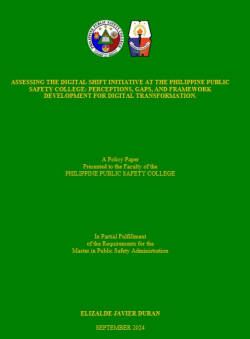INVESTIGATIVE PERFORMANCE OF POLICE GRADUATES OF PUBLIC SAFETY INVESTIGATION AND DETECTION COURSE: BASIS FOR TRAINING MODULE ASSIGNMENT

Type
Thesis
Authors
VILLANUEVA ( CONRADO )
Category
PSOSEC
[ Browse Items ]
Publication Year
2013
Publisher
PPSC - NPC, Philippines
Tags
Abstract
The members of the Philippine National Police (PNP) continue to suffer
resentment of the public that hardly believes in their credibility and capability to
discharge law enforcement functions. Among the reasons are the volume of unresolved
crimes and handling of crime investigations. This study assessed the investigative
performance of police graduates of PSODC for training module alignment. Specifically,
the study sought to answer the following questions: 1.) How do the respondents assess
the investigative performance of police graduates of PSIDC in terms of Knowledge,
Attitudes, Skills, Habits and Values?; 2.) What are the problems that affect the
investigative performance of police graduates of PSIDC; 3.) What are the measures that
can be proposed to address the problems that affect the investigative performance of
police graduates of PSIDC relative to the above mentioned variables?; 4.) Is there a
significant difference in the assessment of the three groups of respondents on the
investigative performance of police graduates of PSIDC, problems encountered that
affect the investigative performance and the corresponding measures in relation to the
aforecited variables? And 5.) What investigative performance directed training module
maybe proposed?
A descriptive research method was used and the Slovin Formula employed in
random sampling of two hundred seventy two (272) respondents composed of 26 or
9.45% supervisors, 82 or 30.11% investigators who are graduates of PSIDC and 164 or
60.44% investigators who are non-graduates of PSIDC. The respondents were from the
cities of Manila, Quezon, Pasay, Makati, Parañaque, Las Piñas, Muntinlupa, Taguig,
Mandaluyong, Pasig and San Juan within the National Capital Region Police Office
(NCRPO). The statement of hypothesis was there is no significant difference in the
assessment of the three groups of respondents on the investigative performance of
police graduates of PSIDC, problems encountered and the proposed measures in terms
of knowledge, attitude, skills, habits and values. Survey instruments and interview guide
were used in gathering data and the statistical tools were percentage, average weighted
mean and the F-test or Analysis of Variance (ANOVA).
The assessment of the three groups of respondents resulted in similar verbal
ratings of “strongly agree” in the knowledge, attitude, habits and values aspects of the
investigative performance of police graduates of PSIDC. The police graduates of PSIDC
and the co-workers had similar verbal descriptions of “strongly agree” on the skills
aspect but the supervisors had “agree”. The test of significant difference on the
assessment of the three groups of respondents on the investigative performance of
police graduates of PSIDC showed that for the knowledge, attitude, habits and values
variables, the computed F-value of 0.34, 1.47, 1.03 and 1.25, respectively were lower
than the tabular critical value of 3.03. Thus, there is no significant difference on the
assessment of the three groups of respondents in the knowledge, attitude, habits and
values aspects of the investigative performance of police graduates of PSIDC.
However, statistical analysis revealed that there is significant difference in the
respondents’ assessments on the skills aspect of the investigative performance of
police graduates of PSIDC as shown by the higher computed F-value of 3.87 compared
to the tabular critical value of 3.03, indicating the rejection of the null hypothesis.
The respondents’ assessment on the problems that affect the investigative
performance of police graduates of PSIDC showed that although there was a difference
in the verbal rating by the co-workers compared with the supervisors and police
graduates of PSIDC, all three groups had the highest overall weighted means on the
knowledge variable. Both the supervisors and police graduates of PSODC had the
lowest overall weighted means on the habits variable while the co-workers had the
values variable. The test of significant difference on the assessment of the three groups
of respondents on the problems that affect the investigative performance of police
graduates of PSIDC showed that for the skills, knowledge. Attitude, habits and values
variables, statistical test using analysis of variance showed that the computed F-values
of 12.95, 11.96, 10.60, 6.41 and 4.17, respectively were greater that the tabular critical
value of 3.03. Thus, there is significant difference on the evaluation of the three groups
of respondents on the skills, knowledge, attitude, habits and values aspects of the
problems that affect the investigative performance of police graduates of PSIDC.
The assessment of the three groups of respondents revealed similar verbal
ratings of “highly recommended” on the skills, knowledge, attitude, habits and values
aspects of the measures to address the problems that affect the investigative
performance of police graduates of PSIDC. However, the highest overall weighted
mean was obtained by the knowledge variable under the respondent supervisors and
co-workers while values variable under the police graduates of PSIDC. In addition, the
lowest overall weighted mean was obtained by the attitude variable under the police
graduates of PSIDC. In addition, the lowest overall weighted mean was obtained by the
attitude variable under the police graduates of PSODC and co-workers while it was the
habits variable under the supervisors. The test of significant difference on the
assessment of the three (3) groups of respondents on the measures to address the
problems that affect the investigative performance of police graduates of PSIDC
showed that for the attitude, values, habits and skills variables, statistical test using
analysis of variance showed that the computed F-values of 2.95, 0.42, 0.24 and 0.21
respectively were lower that the tabular critical value of 3.03. Thus, there is no
significant difference on the evaluation of the three groups of respondents in the
attitude, values, habits and skills aspects of the proposed measures to address the
problems that affect the investigative performance of police graduates of PSIDC. In
contrast, statistical test showed that the computed F-value of 4.93 was greater than the
tabular critical value of 3.03 which means that there was significant difference in the
respondents’ assessment of the knowledge aspect of the proposed measures to
address the problems that affect the investigative performance of police graduates of
PSIDC.
On the basis of the results from data gathering, the following conclusions were
drawn: 1) The skills aspect of the investigative performance of police graduates of
PSIDC, must be improved; 2) Deficiency in skills of resolving issues and concerns that
hamper police investigations in accordance with criminal law and other applicable
special laws is a major problem that affect the investigative performance of police
graduates of PSIDC; 3) More training hours are needed for lectures and practical
exercises on crime scene management and evaluation to determine the deficiency of
training equipment and facilities; 4) There is no significant difference in the assessment
of the three respondents on the investigative performance of police graduates of PSIDC
and the proposed measures to address the problems that affect their investigative
performance in terms of knowledge, attitude, habits and values. In contrast, there is
significant difference in the assessment pertaining to the skills aspect of the
investigative performance of police graduates of PSIDC. In addition, the problems that
affect the investigative performance of police graduates of PSIDC in terms of the
aforementioned variables have significant difference; and 5) The PSODC training
module needs alignment to enhance the investigative performance of the graduates of
PSIDC.
In the light of the conclusions, the following are recommended: 1)The training
module should emphasize developing skills in setting priorities to meet work objectives
and in establishing rapport with victims of crimes, witness, informants and suspects; 2)
The problems in resolving issues and concerns that hamper crime investigations could
be addressed by the institutionalized criteria and selection of instructors; 3) Among the
proposed measures, maximum allowable training hours should be allocated to lectures
and practical exercises on crime scene management and continuing evaluation to
correct deficiencies in training equipment and facilities; 4) The National Forensic
Science Training Institute (NFSTI) should conduct regular consultation with the PNP to
determine the training needs of investigators and align the training module to improve
the performance of police graduates of PSIDC; 5) The NFSTI should implement the
proposed action plan which was formulated based on the results of this study in order to
enhance the investigative performance of police graduates of PSIDC; and 6) Further
research work should be undertaken on the same problem or topic in order to verify,
amplify or negate the findings of this study in the research locale.
resentment of the public that hardly believes in their credibility and capability to
discharge law enforcement functions. Among the reasons are the volume of unresolved
crimes and handling of crime investigations. This study assessed the investigative
performance of police graduates of PSODC for training module alignment. Specifically,
the study sought to answer the following questions: 1.) How do the respondents assess
the investigative performance of police graduates of PSIDC in terms of Knowledge,
Attitudes, Skills, Habits and Values?; 2.) What are the problems that affect the
investigative performance of police graduates of PSIDC; 3.) What are the measures that
can be proposed to address the problems that affect the investigative performance of
police graduates of PSIDC relative to the above mentioned variables?; 4.) Is there a
significant difference in the assessment of the three groups of respondents on the
investigative performance of police graduates of PSIDC, problems encountered that
affect the investigative performance and the corresponding measures in relation to the
aforecited variables? And 5.) What investigative performance directed training module
maybe proposed?
A descriptive research method was used and the Slovin Formula employed in
random sampling of two hundred seventy two (272) respondents composed of 26 or
9.45% supervisors, 82 or 30.11% investigators who are graduates of PSIDC and 164 or
60.44% investigators who are non-graduates of PSIDC. The respondents were from the
cities of Manila, Quezon, Pasay, Makati, Parañaque, Las Piñas, Muntinlupa, Taguig,
Mandaluyong, Pasig and San Juan within the National Capital Region Police Office
(NCRPO). The statement of hypothesis was there is no significant difference in the
assessment of the three groups of respondents on the investigative performance of
police graduates of PSIDC, problems encountered and the proposed measures in terms
of knowledge, attitude, skills, habits and values. Survey instruments and interview guide
were used in gathering data and the statistical tools were percentage, average weighted
mean and the F-test or Analysis of Variance (ANOVA).
The assessment of the three groups of respondents resulted in similar verbal
ratings of “strongly agree” in the knowledge, attitude, habits and values aspects of the
investigative performance of police graduates of PSIDC. The police graduates of PSIDC
and the co-workers had similar verbal descriptions of “strongly agree” on the skills
aspect but the supervisors had “agree”. The test of significant difference on the
assessment of the three groups of respondents on the investigative performance of
police graduates of PSIDC showed that for the knowledge, attitude, habits and values
variables, the computed F-value of 0.34, 1.47, 1.03 and 1.25, respectively were lower
than the tabular critical value of 3.03. Thus, there is no significant difference on the
assessment of the three groups of respondents in the knowledge, attitude, habits and
values aspects of the investigative performance of police graduates of PSIDC.
However, statistical analysis revealed that there is significant difference in the
respondents’ assessments on the skills aspect of the investigative performance of
police graduates of PSIDC as shown by the higher computed F-value of 3.87 compared
to the tabular critical value of 3.03, indicating the rejection of the null hypothesis.
The respondents’ assessment on the problems that affect the investigative
performance of police graduates of PSIDC showed that although there was a difference
in the verbal rating by the co-workers compared with the supervisors and police
graduates of PSIDC, all three groups had the highest overall weighted means on the
knowledge variable. Both the supervisors and police graduates of PSODC had the
lowest overall weighted means on the habits variable while the co-workers had the
values variable. The test of significant difference on the assessment of the three groups
of respondents on the problems that affect the investigative performance of police
graduates of PSIDC showed that for the skills, knowledge. Attitude, habits and values
variables, statistical test using analysis of variance showed that the computed F-values
of 12.95, 11.96, 10.60, 6.41 and 4.17, respectively were greater that the tabular critical
value of 3.03. Thus, there is significant difference on the evaluation of the three groups
of respondents on the skills, knowledge, attitude, habits and values aspects of the
problems that affect the investigative performance of police graduates of PSIDC.
The assessment of the three groups of respondents revealed similar verbal
ratings of “highly recommended” on the skills, knowledge, attitude, habits and values
aspects of the measures to address the problems that affect the investigative
performance of police graduates of PSIDC. However, the highest overall weighted
mean was obtained by the knowledge variable under the respondent supervisors and
co-workers while values variable under the police graduates of PSIDC. In addition, the
lowest overall weighted mean was obtained by the attitude variable under the police
graduates of PSIDC. In addition, the lowest overall weighted mean was obtained by the
attitude variable under the police graduates of PSODC and co-workers while it was the
habits variable under the supervisors. The test of significant difference on the
assessment of the three (3) groups of respondents on the measures to address the
problems that affect the investigative performance of police graduates of PSIDC
showed that for the attitude, values, habits and skills variables, statistical test using
analysis of variance showed that the computed F-values of 2.95, 0.42, 0.24 and 0.21
respectively were lower that the tabular critical value of 3.03. Thus, there is no
significant difference on the evaluation of the three groups of respondents in the
attitude, values, habits and skills aspects of the proposed measures to address the
problems that affect the investigative performance of police graduates of PSIDC. In
contrast, statistical test showed that the computed F-value of 4.93 was greater than the
tabular critical value of 3.03 which means that there was significant difference in the
respondents’ assessment of the knowledge aspect of the proposed measures to
address the problems that affect the investigative performance of police graduates of
PSIDC.
On the basis of the results from data gathering, the following conclusions were
drawn: 1) The skills aspect of the investigative performance of police graduates of
PSIDC, must be improved; 2) Deficiency in skills of resolving issues and concerns that
hamper police investigations in accordance with criminal law and other applicable
special laws is a major problem that affect the investigative performance of police
graduates of PSIDC; 3) More training hours are needed for lectures and practical
exercises on crime scene management and evaluation to determine the deficiency of
training equipment and facilities; 4) There is no significant difference in the assessment
of the three respondents on the investigative performance of police graduates of PSIDC
and the proposed measures to address the problems that affect their investigative
performance in terms of knowledge, attitude, habits and values. In contrast, there is
significant difference in the assessment pertaining to the skills aspect of the
investigative performance of police graduates of PSIDC. In addition, the problems that
affect the investigative performance of police graduates of PSIDC in terms of the
aforementioned variables have significant difference; and 5) The PSODC training
module needs alignment to enhance the investigative performance of the graduates of
PSIDC.
In the light of the conclusions, the following are recommended: 1)The training
module should emphasize developing skills in setting priorities to meet work objectives
and in establishing rapport with victims of crimes, witness, informants and suspects; 2)
The problems in resolving issues and concerns that hamper crime investigations could
be addressed by the institutionalized criteria and selection of instructors; 3) Among the
proposed measures, maximum allowable training hours should be allocated to lectures
and practical exercises on crime scene management and continuing evaluation to
correct deficiencies in training equipment and facilities; 4) The National Forensic
Science Training Institute (NFSTI) should conduct regular consultation with the PNP to
determine the training needs of investigators and align the training module to improve
the performance of police graduates of PSIDC; 5) The NFSTI should implement the
proposed action plan which was formulated based on the results of this study in order to
enhance the investigative performance of police graduates of PSIDC; and 6) Further
research work should be undertaken on the same problem or topic in order to verify,
amplify or negate the findings of this study in the research locale.
Number of Copies
1
| Library | Accession No | Call No | Copy No | Edition | Location | Availability |
|---|---|---|---|---|---|---|
| NPC Library | 676102 | 1 | Yes |




